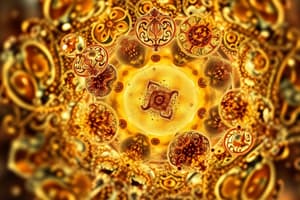Podcast
Questions and Answers
What is the role of MPF in the cell cycle?
What is the role of MPF in the cell cycle?
- It regulates gene shuffling during meiosis.
- It triggers the process of cytokinesis.
- It initiates mitosis by phosphorylating proteins. (correct)
- It promotes the synthesis of cyclin.
What causes cancer cells to divide uncontrollably?
What causes cancer cells to divide uncontrollably?
- They produce excessive amounts of MPF.
- They are unaffected by external chemical signals.
- They lack normal controls like contact inhibition. (correct)
- They have increased levels of growth factors.
During which phase is cyclin concentration highest?
During which phase is cyclin concentration highest?
- G1 phase
- S phase
- G2 phase (correct)
- M phase
What happens to cyclin levels during mitosis according to the control of cell division?
What happens to cyclin levels during mitosis according to the control of cell division?
Which of the following accurately describes contact inhibition?
Which of the following accurately describes contact inhibition?
What is the primary outcome of the process of meiosis?
What is the primary outcome of the process of meiosis?
During which stage of meiosis do homologous chromosomes separate?
During which stage of meiosis do homologous chromosomes separate?
What ensures that the chromosome count remains consistent at 46 in humans after fertilization?
What ensures that the chromosome count remains consistent at 46 in humans after fertilization?
What is the significance of crossing over during meiosis?
What is the significance of crossing over during meiosis?
Which of the following accurately describes the gametes produced by meiosis?
Which of the following accurately describes the gametes produced by meiosis?
What is the term for the exact pairing of homologous chromosomes during meiosis?
What is the term for the exact pairing of homologous chromosomes during meiosis?
What occurs during the second meiotic division?
What occurs during the second meiotic division?
What is NOT a special event during meiosis?
What is NOT a special event during meiosis?
What is the primary function of the cell nucleus?
What is the primary function of the cell nucleus?
During which phase of the cell cycle does DNA replication occur?
During which phase of the cell cycle does DNA replication occur?
Which of the following phases has the longest duration in the interphase?
Which of the following phases has the longest duration in the interphase?
Which process divides the cytoplasm of the mother cell to create two daughter cells?
Which process divides the cytoplasm of the mother cell to create two daughter cells?
What happens at the end of the G2 phase?
What happens at the end of the G2 phase?
Which of the following is NOT a phase of mitosis?
Which of the following is NOT a phase of mitosis?
What term describes cells that have permanently ceased dividing?
What term describes cells that have permanently ceased dividing?
Which stage of the cell cycle includes the cell's active growth and preparation for division?
Which stage of the cell cycle includes the cell's active growth and preparation for division?
What happens to chromatin during the S phase?
What happens to chromatin during the S phase?
Which term refers to the highly condensed form of genetic material?
Which term refers to the highly condensed form of genetic material?
Flashcards are hidden until you start studying
Study Notes
Cell Nucleus
- The nucleus is a cell organelle that functions as the control center of the cell.
- The nucleus contains chromosomes, the genetic material of the cell.
- Chromatin in the nucleus exists in two states: heterochromatin, which is highly condensed, and euchromatin, which is less condensed.
Cell Cycle
- The cell cycle encompasses two major periods, interphase and cell division (mitotic phase).
- Interphase is the period of cell growth and carries out usual activities, including protein synthesis and organelle production.
- Cell division (mitotic phase) is when a cell divides into two cells.
Interphase
- Interphase is the period of cell growth and preparation for division, subdivided into three subphases: G1, S, and G2.
- During the G1 (gap 1) phase, cells actively grow, synthesize proteins, and carry out metabolic activities.
- The S (synthetic) phase is when DNA replication occurs, ensuring that both daughter cells receive identical copies of genetic material.
- The G2 (gap 2) phase prepares the cell for division by synthesizing necessary enzymes and proteins.
DNA Replication
- DNA replication occurs during the S phase of interphase.
Mitosis
- Mitosis is the division of the nucleus, occurring in somatic cells (diploid cells).
- Mitosis is a continuous process, with four phases: prophase, metaphase, anaphase, and telophase.
- Mitosis produces two identical daughter cells with the same number of chromosomes as the original cell.
Meiosis
- Meiosis is cell division that occurs in germ cells (sex cells).
- Meiosis produces haploid (n) gametes, which are the egg and sperm cells.
- During meiosis, diploid (2n) germ cells undergo two cell divisions, reducing the chromosome count to 23.
Significance of Meiosis
- Meiosis ensures the constancy of the chromosome number in each generation by reducing the chromosome number from diploid (2n) to haploid (n).
- It also ensures random assortment of maternal and paternal chromosomes between the gametes.
- Lastly, it allows relocation of segments of maternal and paternal chromosomes by the crossing over of chromosome segments, which shuffles the genes and produces a recombination of genetic material.
Control of Cell Division
- Two key factors influence when cells divide:
- Chemical signals released by other cells, such as growth factors and hormones.
- The availability of space, with normal cells stopping proliferation when they touch, referred to as contact inhibition.
- A key protein complex called MPF (M-phase promoting factor) influences the cell cycle.
- MPF is a cyclin-dependent kinase complex that triggers mitosis at the G2 phase.
- MPF activity fluctuates based on the level of cyclin in the cell.
Studying That Suits You
Use AI to generate personalized quizzes and flashcards to suit your learning preferences.




